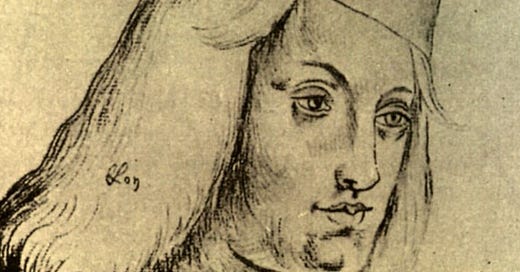Perkin Warbeck is one of the best known all false pretenders to the throne of England. Warbeck had the fortune as well as the misfortune to come at more or less the right time to be backed successively in his fatuous claims by France, the Holy Roman Empire and the King of Scotland.
Warbeck, who was born in the Belgian city of Tournai in circa 1474, pretended to be the returned Richard of Shrewsbury, the Duke of York, and claimant to the throne of England from Henry Tudor of Lancaster (or Henry VII). Warbeck failed in his pretensions to the throne, but what has long been discussed among historians is the possibility of his being a converted jew.
Bram Stoker, the author of Dracula, picked up on this in his ‘Famous Imposters’ and treated it as a fact. (1) Other more recent authors dispute this assertion, (2) but yet are not able to provide concrete evidence for why it is false.
The origin of this assertion is the English polymath Francis Bacon who wrote in his 1622 ‘History of the Reign of King Henry VII’ that Warbeck’s father ‘was John Osbeck’ who was ‘a converted Jew’ who had married one Catherine de Faro. (3)
The problem with Bacon’s assertion is that other sources who were contemporary with Warbeck such as Polydore Vergil in his 1534 ‘Anglica Historia’ make no mention of any jewish background. (4) It has long been noted that Bacon’s assertion that Warbeck’s father was a converted jew is likely wrong as there is no evidence to support and much to contradict it. (5)
It is also helpful to note that Warbeck’s father wasn’t a John Osbeck at all, but rather one Jehan de Werbecque (i.e. John of Warbeck) while his mother was a lady named Nicaise Farou. (6) Both Jehan de Werbecque and Nicaise Farou were born in Tournai as far as we know and both their families went back several decades of residence there.
However this is where it gets interesting.
The de Werbecque family was newer to Tournai than the Farou family with the latter having been resident there as early as 1413. (7) The problem is of course that Farou is not a Belgian surname, but rather a Portuguese one.
Focus on Warbeck’s potential jewish ancestry among scholars has thus shifted from his father to his mother. (8)
Were the Farou family jewish?
Arthurson argues that it is not likely because of the ‘long residence’ of the Farou family in Tournai. (9)
It is reasonable to argue that jews should not have been resident so long in Tournai without some kind of harassment or official notice. However, Arthurson fails to note that it is quite possible and rather more likely that the explanation for this is that the Farou family were Marranos (i.e. superficial jewish converts to the Christianity of the Roman Catholic Church) and not openly jewish (therefore seemly just Christian merchants from Portugal as opposed to jews).
Evidence of this can be found for example in the Marrano jewish community in England a decade later and which was derived from the same area the Farou family resided. Where we find explicit and conspicuous mention of Marrano jews surnamed Faro and Farou. (10)
Given that we can see that there were Marranos surnamed ‘Faro’/‘Farou’ in the area at the time. It is thus likely – although we can’t be absolutely sure – on the basis of what evidence we have that Perkin Warbeck’s mother Nicaise Farou was from a jewish family. Therefore, on the basis of jewish religious law it is probable that Warbeck was indeed jewish.
References
(1) Bram Stoker, 1910, ‘Famous Imposters’, 1st Edition, Sturgis & Walton: New York, p. 11
(2) Ian Arthurson, 1994, ‘The Perkin Warbeck Conspiracy 1491-1499’, 1st Edition, Sutton: Stroud, p. 27
(3) Francis Bacon, ‘History of the Reign of King Henry VII’, p. 106 (Lumby Edition)
(4) Polydore Vergil, ‘Anglica Historia’, 26:24
(5) Bacon, Op. Cit., p. 271; Arthurson, Op. Cit., p. 27
(6) Arthurson, Op. Cit., p. 27
(7) Ibid.
(8) Ibid.
(9) Ibid.
(10) For example Albert Hyamson, 1951, ‘The Sephardim of England: A History of the Spanish and Portuguese Jewish Community 1492-1951’, 1st Edition, Methuen: London, p. 31



